I was even ashamed to speak Russian for a while, but I won't let Putin steal that from me too, he already stole my country
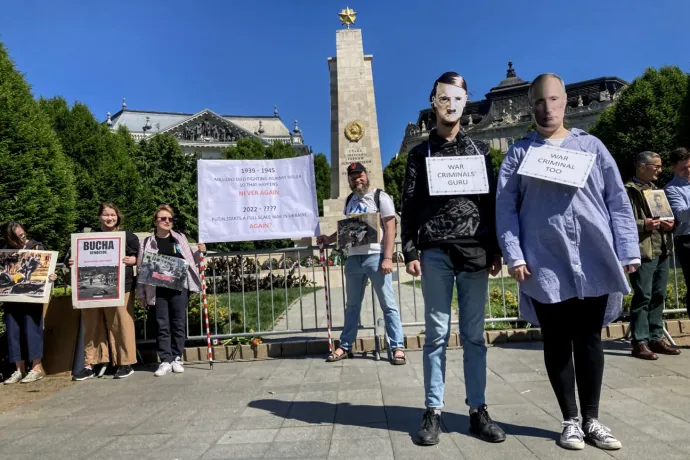
"I feel guilty because of my government, which I did not elect, and because of my passport and my background." "My mother says I'm a traitor, we don't talk politics any more, we just greet each other on birthdays, that's all that’s left." "For a while, I was even ashamed to speak Russian, but then I decided not to let Putin take my mother tongue from me too, after stealing my country." – We spoke with Russians living in Hungary about how they have experienced Russia's war against Ukraine, the circumstances of them leaving their country, what happened to their friendships and family relationships, and whether they will ever return to Russia.
"Why, does everyone in your country vote for Orbán? Well, not everyone there is crazy about Putin either – that's what I tell Hungarians who are surprised that as a Russian, I'm against the war and I think we should support Ukraine, because Russia can't be allowed to win." Elmira had been working for an international telecom company for many years when Vladimir Putin launched the Russian military campaign against Ukraine on 24 February last year. She lived in Moscow with her family and was not involved in politics.
The last Soviet generation
Elmira was 12 when the Soviet Union broke up in 1991. She had Kyrgyz, Kazakh, Georgian, Armenian and Ukrainian friends, and even in post-Soviet Russia she felt a sense of community with all those with whom she was connected through the Soviet past and the Russian language. Her father is from Azerbaijan and her mother is Russian, but they only spoke Russian at home. She wasn’t politically engaged before. She worked in the Moscow office of a global corporation for a long time, and lived the life of the most fortunate members of the Russian middle class, enjoying the economic boom of the 2000s, from which the capital benefited most.
"I didn't believe there would be a war. Although our Ukrainian colleagues said it would happen, all of us at the office just smiled at their conviction." Like many others, Elmira didn't think that war was imminent even when Putin recognised the breakaway states of Donetsk and Luhansk as independent countries on 22 February, following a bizarre national security meeting that was said to be live but was in fact broadcast after the fact. At that point though, she did begin to worry:
"I posted on Facebook that I'd get down on my knees and pray that there would be no war".
Today, she would be prosecuted for such a post. Calling the "extraordinary military operation" a war or even rejecting it is more than enough to land someone in jail.
In hindsight, it is understandable why Elmira was confident that there would be no war – or, more precisely, no open war extending to the whole of Ukraine. After all, the war actually started in 2014, with covert Russian support for the separatists in eastern Ukraine and the open seizure of Crimea – but eventually that too came to a halt and got stuck in a phase which was neither peace nor open war. Following some heavy clashes here and there, this more or less became the case on the line bordering the separatists in eastern Ukraine as well.
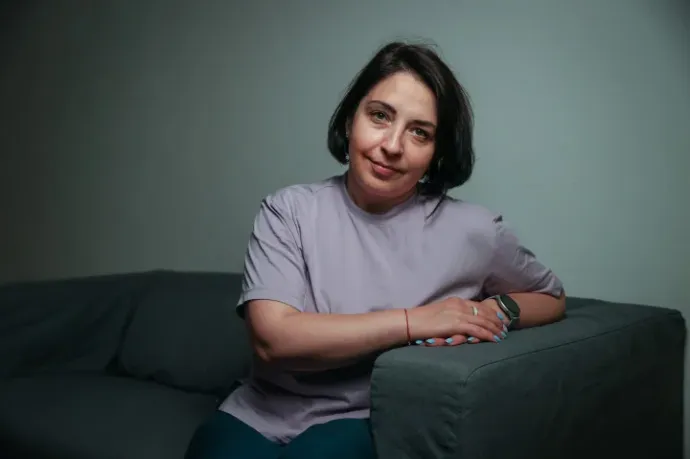
On 24 February, however, Russia attacked the whole of Ukraine. "I barely had the emotional strength to work. I didn't eat, I was nauseous, I needed to take sleeping pills, I switched to working from home. We didn't really celebrate my sons' birthdays either, we just gave them their presents. I wanted to leave immediately, at least to visit my relatives in Azerbaijan, but the company's business was progressing more slowly, so I stayed.
Finally, in the summer, the company told me that they would either dismiss me with severance pay or help me relocate and we could continue working from abroad."
Her family spent a few months in Istanbul and then came to Hungary, and they have been working here ever since. Elmira's 10-year-old children are attending the Serbian national minority's school – it’s easier for them because of the linguistic similarities with Russian. Her husband is also working and they received some help with housing. “I'm not complaining, many refugees from Ukraine who come after their homes have been destroyed, don't get so much help.”
Elmira didn't participate in protests at home – although once she did go out to the Red Square in a blue and yellow outfit reminiscent of Ukraine’s national colours, but saw no consequences. Her husband did take part in a demonstration, and it was only by luck that he wasn't arrested. An acquaintance of hers was fined 50,000 roubles – a thousand euros at the time – for carrying a sign in their backpack that had 'No to war' written on it. Of course, nowadays you don't even need to do that much. Some people went out with a world map – which was actually a play on words, as in Russian the word for 'world' and 'peace' is the same word 'mir' – later it was enough to stand holding a blank sheet, and after a while, one didn't even have to protest – for legal action to be taken against the parents, it was enough for the child to submit a drawing condemning the war in school.
“In spite of all this, at first I still longed to go home, even if I disagreed with what was happening there. But now I can cope with homesickness more easily, I think of Ukraine and my heart overflows with pain.”
If we don't go back, who will?
Alexei left Russia last summer, also with the help of his employer's company, which was leaving the country. He could easily do so at the time, given that the partial mobilisation, which would have included him as well, only came into force at the end of September last year. The programming expert didn't believe there would be a war either, but he also wouldn’t have believed that Ukraine could resist if there was one. “I was in Lviv and Kyiv in January 2022, and there was a lot of talk about war. Many people were saying that they didn't want war, but they were ready to fight if they were attacked.”
Alexei was also shocked on 24 February. "I didn't eat, I hardly slept, I couldn't even talk to my Ukrainian friends for a week." If he raised his voice against the war among his acquaintances, he was told he was biased because he was half Ukrainian. Alexei discovered his Ukrainian roots in his teens and even learned Ukrainian afterwards.
"My mother didn't condone the war either, but she thought Putin had no choice. So we prefer not to talk about it." Alexei has pro-war relatives with whom he no longer has a relationship. "They used to think differently about, say, Stalin, but that was more of an annoyance, it didn't seem as big of an issue as it has been since the war broke out."
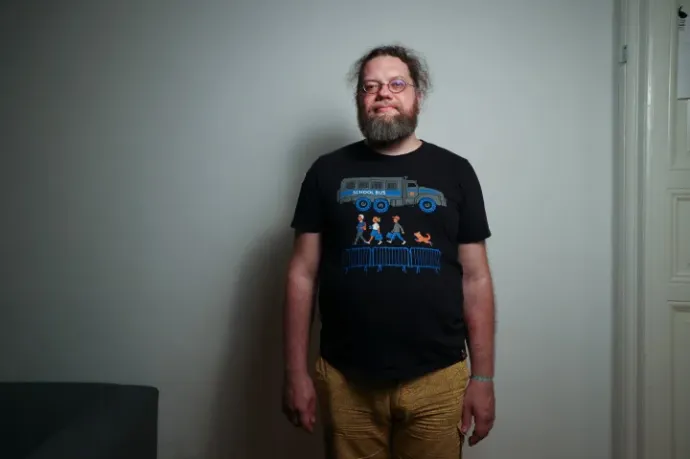
His wife and son are still in Moscow, but they think about the war the same way he does. There is no technical barrier to them staying in touch. The use of Facebook, and therefore Messenger, is limited, but they can talk on Viber and Signal without interference.
In the longer term, he is definitely thinking of returning, even if he is afraid of the regime. "If we don't go back, who will?" – he asks.
My grandmother says I'm a traitor
Polina, 39, had long been looking for a way out of a politically more and more stifling Russia, and the war provided the final push. She had spent some time abroad before, having completed university in Slovakia and the Czech Republic before returning to Russia in 2018. Instead of moving back to her hometown of Orenburg, near Kazakhstan, she moved to Omsk, where she worked for the Ministry of Culture. "I was naive, I thought that my European experience would help me change the mentality at home. It took me a year and a half to realise that it was hopeless, and that you can only get ahead if you have the right connections. Those who are working hard will always be left as workhorses".
During the Covid pandemic, she quit the civil service, went to St. Petersburg and took up language teachin. Her knowledge of languages was sufficient: in addition to English, Czech and Slovak, she had the Finno-Ugric Mordvin through her father, Tatar on her mother's side – and of course, Russian. “It's funny that my maternal grandmother used to hold it against me that she thought I felt more Russian than Tatar, and now she resents me for having left Russia.”
"My mother and sister are also against the war, but my father belongs to the group that thinks 'it's not that simple', we certainly don't see the whole picture" – but the powers that be do. "My paternal grandmother says I'm a traitor because it's the Europe I hold dear that brought the war on us, which is of course a bad thing, but the world has left Putin no choice. My grandmother is Orthodox, but if she could choose a religion, it would be Putinism."
If it had been possible, Polina would have left Russia with her husband at the time of the pandemic, but that was impossible. At the end of 2021, she was offered a job as a professor of Russian at a university in Turin, but before they could finish all the paperwork, the war broke out and teaching Russian was temporarily suspended by the University of Turin.
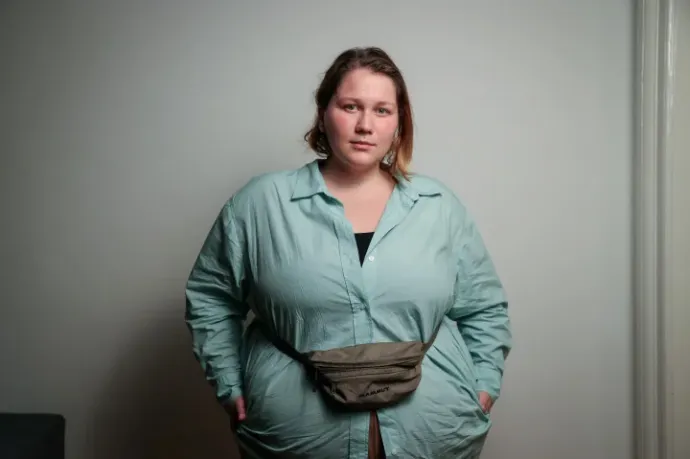
Polina didn't follow the traditional Soviet opposition scenario, meaning that she didn't only talk politics in the kitchen, but took an active part in protests. She and her husband demonstrated several times for the imprisoned opposition leader Alexei Navalny, and they also took to the streets on 24 February last year, when there were still demonstrations condemning the invasion of Ukraine. These didn't disappear because everyone in Russia is 'rooting for the Russians', which is what ( Hungarian pro-government commentator) András Bencsik said of himself – and by 'the Russians' he really meant the Kremlin – but because the police cracked down on them quickly. Those who participated have faced detention and heavy fines.
Polina, for example, got her first fine of 50,000 roubles (about 190,000 forints or 490 euros) for a "No war" sign, and then got a second one for participating in another peaceful protest. “When they saw that this didn't deter me, the third time they fined me 400,000, which is the maximum fine a legal person can receive. A private individual can only be fined less than that, but they were able to do this because I was an entrepreneur.”
In August 2022, Polina and her programmer husband both secured jobs at global companies, both with offers to work in Hungary. That was a stroke of luck in itself, but any job offer would have been, because Polina's experience was that with a Russian passport this was becoming increasingly difficult. But right before they could leave, the Russian president ordered mobilisation, and the borders were quickly closed to the men who could be called up. Polina and her husband were quick, they drove through Orenburg to Kazakhstan and crossed the border without any problems. With her husband safe from the draft, Polina went back to Russia once more to take care of some final errands.
The second time around, it took her six days to get to Kazakhstan after waiting in a 30-kilometre queue of those fleeing by car.
"At the border, the Russians were selling a litre of water to those waiting in line for the equivalent of 1,300 forints. On the other side, the Kazakhs were helping with free accommodation, it was like a whole other planet," Polina recalls. She soon got the visa she needed to work in Hungary.
“After Kazahstan, between 21 September and the beginning of February, my husband spent time in Turkey, Serbia and Montenegro, because he didn't need a visa to those places. Only then did he get a Schengen visa, but he had to wait until the end of April this year to receive the one that allows him to work," Polina said, indicating that Russians who oppose the war and want to leave Russia for political reasons are also facing difficulties.
The half-million ruble fine imposed on Polina for protesting remains in force. It was only an administrative error that allowed her to leave the country.
"It's a relief for my mother that we live here. We don't have to fear the police, or that someone will pick on my husband just because he has a beard, as was always the case at home. Whatever happens, we won't be returning to Russia”, Polina said.
We are the exception among our relatives
Mikhail has been in Hungary since November. He comes from Rostov-na-Donu, the city which was occupied by the Wagner group during Yevgeny Prigozhin's day-long rebellion. "It was frightening to watch the news and see those mercenaries take over the places where I spent all my life." But he got to watch that from a distance; following 15 months filled with much trepidation.
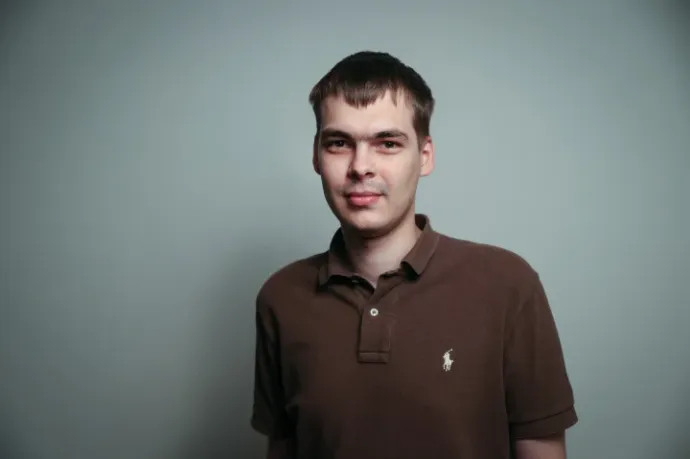
"In February 2022, my fiancée and I knew right away that we wanted to leave, which is why we moved up our wedding." As a programmer, he received a job in Hungary from his company, which was preparing to leave Russia, but he also had to wait for his visa for quite long. So much so that, when the mobilisation began last September, he was still waiting for his Schengen visa at the consulate in Kazan, 1,200 kilometres from his home.
He ended up buying a plane ticket to Armenia instead, to avoid being conscripted. "The ticket for the 45-minute flight from Sochi to Yerevan cost 150,000 rubles, even though it used to be less than 30 thousand before. The plane had to wait for three hours in Sochi. It was the longest three hours of my life," he recalls. From there, the company that offered him a job in Hungary, helped both him and his wife, also a programmer, get to Budapest, where they now rent an apartment. They have no plans to go home.
"Among our extended family, my wife and I are the exception with our views on Putin. All our relatives are hooked on television, they support everything that’s going on. My father even went to Donetsk in 2018." (This is the Russian-controlled separatist state established after 2014, known as the Donetsk People's Republic, which Russia recognised as an independent state before the attack last February and annexed in the autumn.)
“We are traitors in the eyes of our family. I can only talk to my sister, she is a moderate pacifist. As far as the others are concerned, if I do talk to them, we don't talk politics. I can no longer talk to friends there either. Regardless of Putin, I already know that I have no desire to return.”
We knew that Russia would eventually become a prison
The woman who introduces herself only as Maria isn't going back either. True, she left in 2009, but even then she had no illusions about the Putin regime. She grew up in a small village 400 kilometres from Moscow. “I saw the world outside Moscow: the dying villages, the factories that were being stripped down, the free looting done by those in power who kept having themselves re-elected.”
There was a time before that when she still had hopes for a change of power, she even trusted President Dmitry Medvedev, who formally replaced Putin, as the kind of liberal face of the Kremlin. In the end, however, he only kept the seat warm for Putin for four years – not least by presiding over the conflict with Georgia, which ended with him recognising the breakaway states of South Ossetia and Abkhazia, much in the same way it later happened in eastern Ukraine – but at a time of prosperity and good macroeconomic indicators, few in the capital found this troubling.
"Still, you could tell that within a few years, the country would become a prison. Then came the judicial reform, which allowed a commission influenced by the head of state to appoint judges. By 2010, I knew I wouldn't be going back. She has stuck to her decision and hasn't been home since 2011.
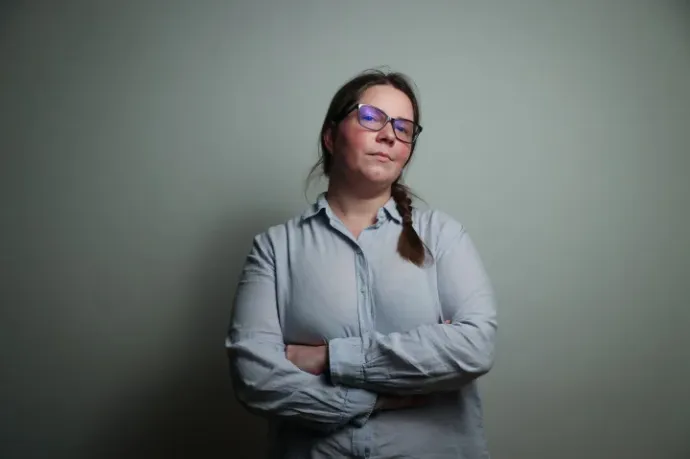
Of course, even living in Hungary, she felt the effects of the outbreak of the war against Ukraine. “I think the war actually started in 2014. I have been ashamed of my passport and my citizenship since then.”
That the war was entering a new stage was made certain two days before the Russian invasion of Ukraine, when, at a national security meeting, Putin had members of the Russian leadership vote to recognise the separatist states of Donetsk and Lugansk. She considered the meeting – at which Foreign Minister Sergey Lavrov, Prime Minister Mikhail Mishustin and, above all, the head of the Foreign Intelligence Service (FIS), Sergey Naryshkin, did not enthusiastically support the recognition of the separatist states – a preparation for war.
"I felt guilty about my country, my background, my government, which I didn't even elect" – Maria says. She has tried to ease this feeling of guilt by helping Ukrainians for years.
Her employer's Ukrainian office relocated the Kyiv staff to Lviv, from where Maria helped organise their onward travel to Poland.
“Since I couldn't protest, I worked on this for 20 hours at a time. We collected humanitarian aid for refugees, both inside and outside the company. I find it unbelievable that such a war is possible right here, next to us in the 21st century, and that people are forced to flee from the tanks of the country of which I am a citizen.”
The crippling shock of war wasn't alleviated by relatives back home. "When it comes to politics, both my mother and grandmother approached the situation by saying that "we don't know anything about this, and besides, there's nothing we could do." I know that I can't change this mentality. The last time we spoke about politics was in 2010. Since then, we greet each other on birthdays, but that's about it".
Even as a tourist, one could see that things weren't going well
Denis' situation is unique: he was seven years old when he and his parents settled in Hungary in 1996. Although he grew up here, he himself is still exclusively a Russian citizen. He finished his schooling here, but also spent summers in Moscow visiting his grandparents.
"I was a tourist, I enjoyed it. My relatives always said everything was great, and I didn't really follow Russian day-to-day life. It was around 2010-11 that I realised that everything wasn't so great," Denis, who was 22 at the time says, remembering the disputed parliamentary elections and the protests against the elections that secured Putin's return to the presidency.
Because there were demonstrations in both Moscow and St Petersburg in the tens of thousands, where even some of Putin's former trusted men spoke up – including Alexey Kudrin, who was finance minister for 11 years, and was sidelined for a time but who later re-engaged with Putin as an adviser and was even appointed chairman of the Court of Audits for a few months last year – but the protests had no repercussions at home or abroad. The outside world noted Putin's victory in 2012 and the protests died down. Later, the police started cracking down harder on those who persisted with protesting.
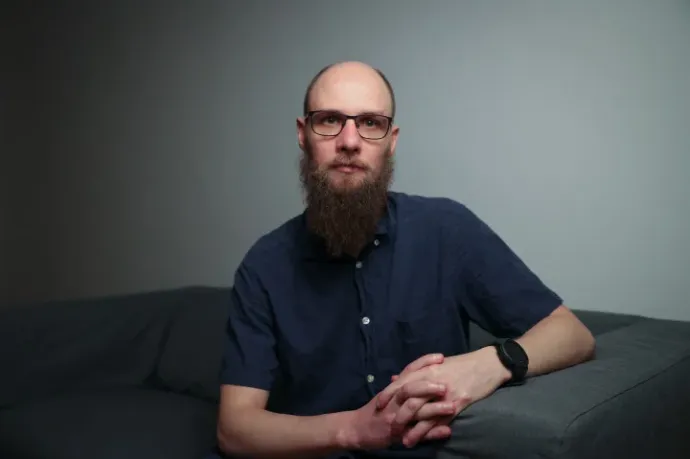
Denis didn't take part in the protests, but he didn't agree with the annexation of Crimea nor the armed support for separatists in eastern Ukraine. He did not, however, expect the invasion of Ukraine last February. He never believed the Kremlin's later argument that if Russia had not acted, Ukraine would have attacked.
“Even when the news were about the repositioning of the forces, I kept hoping that there would be no war. Then I woke up on 24 February and saw the news and was, well, how shall I put it, very much surprised.”
Later that day he took part in the first demonstration on Budapest’s Andrássy Avenue in front of the Russian embassy. "I had a difficult conversation with my father on the phone, he was in Moscow at the time. He said that if we were going to protest, we should have gone to the Ukrainian embassy too, after all, there are two parties to the war. I told him that it was Russia that attacked Ukraine, and he said that things weren't so simple" – this is a recurring phrase quoted by many who believe that Moscow should not be blamed for the outbreak of the war.
Denis didn't subscribe to this view. "Instead, I asked my Ukrainian friends how I could help. I volunteered, I collected aid, I went out to meet the Ukrainians arriving at the railway station." He then took part in several demonstrations, joining Ukrainians protesting against the Russian aggression.
I'm not going home as long as Putin's alive
Arseniy has been living in Hungary since 2016. There were personal reasons for this, but his departure was also motivated by the fact that Russia’s institutions were being dismantled, and he felt it was better to detach himself from that. "I was interested in politics as early as high school, but at the time I was chaotically bouncing between left and right." From 2011, however, he took part in the previously mentioned demonstrations, protesting first against the parliamentary elections and then against the presidential election that brought Putin another victory – after which Putin was given a six-year term instead of the previous four, thanks to a constitutional amendment proposed by the servile interim president Dmitry Medvedev.
"Everyone was demonstrating", he says recalling that hundreds of thousands of people took to the streets and thousands were arrested by the police, pointing out that there still were opposition parties "within the system", i.e. those who were tolerated by the authorities and allowed to stand for election and gain representation in parliament – and they were also protesting.
The regime became tougher after that, with the annexation of Crimea and Russian support for separatists in eastern Ukraine following in 2014, but Arseniy still didn't think that Russia would launch a real war against Ukraine in February 2022. Instead, he expected more spectacular Russian power-playing in Crimea and more visible support for the republics of Donetsk and Luhansk, which Moscow had just recognised as independent.
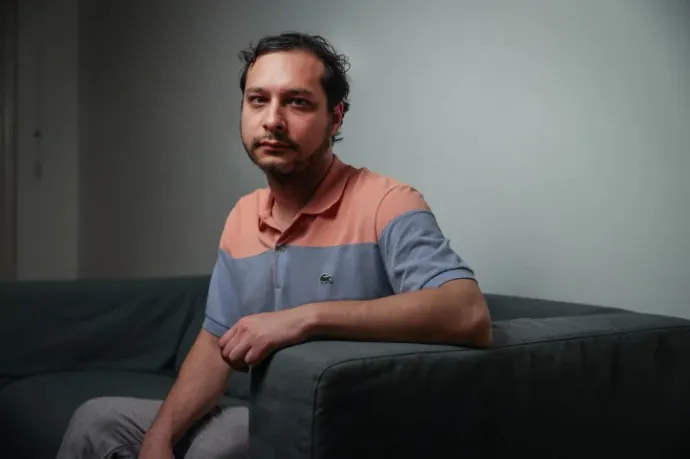
On the day the war began, he was being discharged from a Budapest hospital. "When I heard the news, I thought I was still under the influence of the drugs I had been given at the hospital."
He hasn't yet decided whether he will ever go home. But he doesn't think he would dare do so in Putin's lifetime. The president who has run the country for essentially 24 years is now 71.
Every time my mom reads some shit, I'm back to square one
The seven stories reveal very different fates. Each of those we spoke with came to Hungary at a different time and age, they came from various parts of Russia, but they are all linked by the trauma of war, personal guilt and having to live with fractured family relationships, mostly with their parents.
"It's hard with my mother, she has also bought into the whole 'not everything is so straightforward' line. There are times when I manage to convince her of something, but then we don't talk for a while, she reads some shit on the internet again, – the source is not so much TV. And then I'm back to square one," Arseniy said.
“Cheap trolls are pushing the bullshit, and in big quantities. Paid anti-Ukrainian ads are everywhere, saying that Zelensky is a drug addict, a Nazi, whatever, these are the things people are being bombarded with. You don't have to be ideologically committed for it to impact you. My mother isn’t either, but eventually, this amount of propaganda and the feeling that these are bigger processes than us, that none of it is up to us anyways, that we don't know all the details – these things win out, and you ultimately give in.”
Arseniy said that as a member of the Russian nation, he definitely has a responsibility of his own. “Yes, I do feel a collective responsibility, and this goes hand in hand with a sense of belonging to my nation, which is an important force, a heritage. That's why I volunteered, and collected packages for refugees. Many of my Russian-speaking friends were active in the same way.”
It was precisely this responsibility as a member of the Russian nation, and the sense of personal guilt generated by this, that led him and others not only to join the demonstrations organised by Ukrainians, but to also act separately, as Russian citizens who don't support the war.
There was a Facebook group, Ark (Kovcheg), where Russian expats discussed practical matters. It was Polina who suggested that they could show solidarity by demonstrating. The majority of the Facebook group responded by saying that this was not the platform for that, so it wasn't organised there, but the suggestion brought together those who agreed with the idea..
That's how 'Vogyunk' was born on Facebook – the self-ironic, made up Hungarian word, which is a bit of a spoof on the Russian accent (when speaking Hungarian), and an acronym for 'Vissza Oroszország, Győzelmet Ukrajnának, Nemet a Kegyetlenségre" (Go back Russia, Victory for Ukraine, No to Atrocity).
These were the things they demonstrated for in Budapest’s Szabadság Square on 9 May, wearing Putin and Hitler masks.
This is the day which in Russia marks the end of World War II, the defeat of Nazism, the significance of which is beyond dispute. "It is another matter that Putin has appropriated this holiday too. We wanted to take it back a bit by laying a wreath at the Soviet memorial, which had been surrounded by a cordon (allegedly set up at the request of the Russian embassy), with the permission of the police officers who were guarding the site." The wreath bore an inscription in English: "1939-1945 – Millions died fighting Hitler so that this could never happen again. 2022-???? – Putin launches a full-scale war against Ukraine. Is it happening again?" The cordon was taken down by the authorities shortly afterwards, and so was the wreath.
“We found the wreath and put it back after the protest. However, it provoked conflicting emotions among some of those present. For example, some people called the police on us because they considered our wreath to be a provocation and an act of fascism.”
Others refused to believe that the anti-Putin protesters were really from Russia and not Ukraine. “There were Russians who live here who said we were provocative fascists. Some are influenced by TV. And it would fit into their worldview more easily that as Russians we are not protesting against Putin.”
The Kremlin respects those who aren't afraid of it
"There was a time when I was ashamed to speak Russian. But I won't let Putin take my language too, he already stole my country. Yes, we feel remorse, but we also want to show the locals that we need to help Ukraine. Peace will come when Ukraine wins. And for that we need arms shipments and sanctions," Maria said.
“Orbán often acts as if he was trying to stick a rod between the spokes.”
Hungary's foreign policy, which is out of step with both the EU and NATO, is an eyesore for all of them. "Maybe they should spend more time talking to Russians who understand Russia's power structure." Arseniy says it's a mistake to say "Putin is too strong, let's not provoke him", for example by sending arms shipments. “This is a misunderstanding of the Russian way of thinking about power. Russian authorities see this caution as cowardice, and once they sense it, they will blackmail. They only take seriously those who they see are not afraid. The regime of violence only respects strength. That is why Ukraine must be fearlessly supported.”
"Protesting is important, and we risk a lot by doing it, even though we live here now," Elmira said. "We have relatives back home, and if we were to go home, this activity could have consequences. But we need the world to see that even among Russians, not everyone is fond of Putin."
For more quick, accurate and impartial news from and about Hungary, subscribe to the Telex English newsletter!